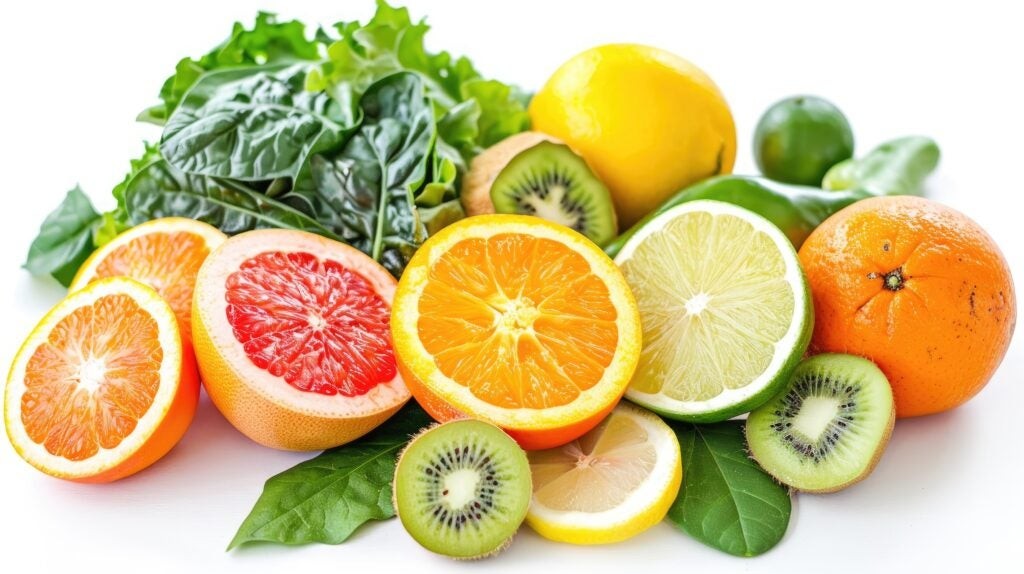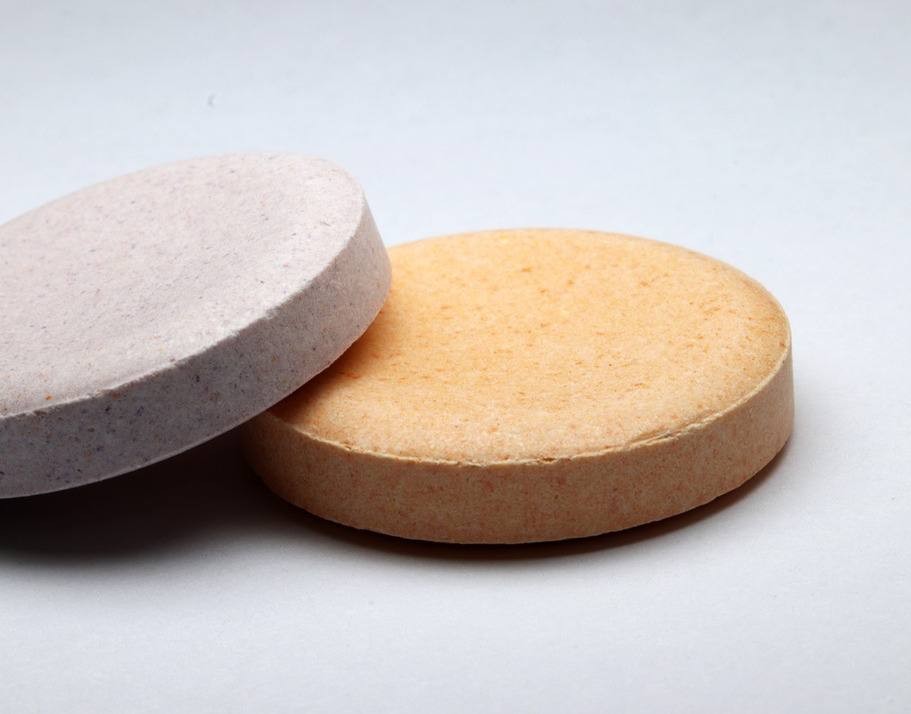Vitamin C is your ally in the fight against sniffles and beyond, and at FOODS.EDU.VN, we’re here to guide you to the most delicious and effective sources. This essential nutrient, known as ascorbic acid, is not stored well in the body, so daily intake through a balanced diet rich in vibrant fruits and vegetables is key to maintaining optimal health. Explore the diverse world of vitamin C-rich foods, understand their benefits, and discover how to easily incorporate them into your daily meals.
1. Why is Vitamin C Important?
Vitamin C isn’t just for fighting colds; it’s a multifaceted nutrient that plays crucial roles in maintaining overall health. Let’s explore its diverse benefits:
- Immune System Support: Vitamin C boosts the immune system by stimulating white blood cell activity and acting as an antioxidant, neutralizing harmful free radicals.
- Collagen Production: It’s essential for collagen synthesis, a protein vital for healthy skin, tendons, ligaments, and blood vessels.
- Antioxidant Protection: As a powerful antioxidant, vitamin C protects cells from damage caused by free radicals, contributing to the prevention of chronic diseases.
The National Institutes of Health (NIH) emphasizes the importance of vitamin C as a vital nutrient for maintaining overall health and well-being. Its antioxidant properties and role in collagen synthesis make it indispensable. (Source: NIH, Vitamin C Fact Sheet)
2. Recommended Daily Intake of Vitamin C
Knowing how much vitamin C you need daily is crucial for maintaining optimal health. Here’s a breakdown of the recommended amounts:
- Adults (19+ years):
- Men: 90 mg daily
- Women: 75 mg daily
- Pregnancy: 85 mg daily
- Breastfeeding: 120 mg daily
- Smokers: Additional 35 mg daily (due to increased vitamin C depletion)
The Food and Nutrition Board (FNB) at the Institute of Medicine of the National Academies provides these guidelines, highlighting the importance of vitamin C for various life stages and conditions. (Source: FNB, Dietary Reference Intakes)
3. Top Foods That Are High in Vitamin C
Looking for a natural way to boost your vitamin C intake? FOODS.EDU.VN has you covered. Here’s a list of top foods that are not only delicious but also packed with this essential nutrient:
3.1 Citrus Fruits
Citrus fruits are synonymous with vitamin C. They are easy to find and incredibly versatile.
- Oranges: A classic source, perfect for juices, salads, and snacks.
- Grapefruit: A tangy choice that can be enjoyed in breakfast bowls or as a refreshing snack.
- Lemons and Limes: Great for adding flavor to water, teas, and various dishes.
According to the USDA FoodData Central, one medium orange provides about 70 mg of vitamin C, fulfilling a significant portion of the daily requirement. (Source: USDA FoodData Central)
3.2 Berries
Berries are not only delicious but also packed with antioxidants and vitamins.
- Strawberries: These sweet, juicy berries are perfect for smoothies, desserts, and salads.
- Blueberries: Known for their antioxidant properties, blueberries also offer a good dose of vitamin C.
- Cranberries: Often consumed as juice, cranberries can be a tart and healthy addition to your diet.
Research published in the Journal of Agricultural and Food Chemistry highlights that berries are rich in vitamin C and other beneficial compounds. (Source: JAFC)
3.3 Tropical Fruits
Tropical fruits offer unique flavors and impressive vitamin C content.
- Kiwi: A small but mighty fruit, packed with more vitamin C than many citrus fruits.
- Mango: Sweet and versatile, mangoes are great in smoothies, salads, and as a standalone snack.
- Papaya: Known for its digestive enzymes, papaya also provides a good amount of vitamin C.
A study in the British Journal of Nutrition found that tropical fruits like kiwi and mango are excellent sources of vitamin C, promoting overall health. (Source: BJN)
3.4 Vegetables
Many vegetables are surprisingly high in vitamin C.
- Bell Peppers: Especially red and yellow bell peppers, are excellent sources of vitamin C.
- Broccoli: A cruciferous vegetable that’s great steamed, roasted, or added to stir-fries.
- Spinach: While it also contains iron, spinach is another fantastic source of vitamin C.
According to the NIH, bell peppers and broccoli are among the best vegetable sources of vitamin C. (Source: NIH, Vitamin C Fact Sheet)
3.5 Other Notable Sources
Don’t overlook these other excellent sources of vitamin C.
- Tomatoes: Versatile and used in many dishes, tomatoes are a reliable source of vitamin C.
- Cauliflower: Another cruciferous vegetable that’s great roasted, steamed, or mashed.
- Brussels Sprouts: Often roasted or sautéed, Brussels sprouts are packed with nutrients.
A report by the World Health Organization (WHO) notes that including a variety of fruits and vegetables in your diet ensures a good intake of vitamin C from multiple sources. (Source: WHO)
3.6 Vitamin C Content in Common Foods (per serving)
| Food | Serving Size | Vitamin C Content (mg) |
|---|---|---|
| Orange | 1 medium | 70 |
| Grapefruit | 1 medium | 79 |
| Kiwi | 1 medium | 64 |
| Strawberries | 1 cup | 89 |
| Bell Pepper (Red) | 1/2 cup | 95 |
| Broccoli | 1/2 cup | 51 |


4. The Benefits of Vitamin C: Beyond the Common Cold
Vitamin C offers a wealth of health benefits beyond just warding off the common cold. Let’s explore its impact on various aspects of your well-being:
4.1 Heart Health
Vitamin C’s antioxidant properties play a key role in cardiovascular health.
- Reducing Oxidative Stress: Vitamin C helps neutralize free radicals, reducing oxidative stress that can damage blood vessels.
- Improving Blood Vessel Function: Studies suggest that vitamin C can improve the dilation of blood vessels, promoting healthy blood flow.
- Lowering Blood Pressure: Some research indicates that vitamin C may help lower blood pressure, contributing to overall heart health.
A meta-analysis published in the American Journal of Clinical Nutrition found that vitamin C supplementation is associated with a significant reduction in blood pressure. (Source: AJCN)
4.2 Immune System Boost
Vitamin C is a powerful ally in strengthening your body’s defenses.
- Stimulating White Blood Cells: It enhances the production and function of white blood cells, which are crucial for fighting infections.
- Antioxidant Defense: As an antioxidant, it protects immune cells from damage caused by free radicals.
- Reducing Inflammation: Vitamin C helps reduce inflammation, supporting a balanced immune response.
Research in the journal Nutrients highlights vitamin C’s role in supporting various immune functions, from cellular to systemic levels. (Source: Nutrients)
4.3 Skin Health
Vitamin C’s role in collagen synthesis is essential for maintaining healthy, radiant skin.
- Collagen Production: It’s crucial for the synthesis of collagen, which provides structure and elasticity to the skin.
- Antioxidant Protection: Vitamin C protects the skin from damage caused by UV radiation and environmental pollutants.
- Wound Healing: It promotes faster wound healing by supporting collagen formation.
A study published in the journal Dermatology Times notes that topical and dietary vitamin C can improve skin health by stimulating collagen synthesis and providing antioxidant protection. (Source: Dermatology Times)
4.4 Cancer Prevention
While not a cure, vitamin C may play a role in cancer prevention due to its antioxidant properties.
- Neutralizing Free Radicals: It helps neutralize free radicals that can damage DNA and lead to cancer development.
- Supporting Immune Function: By boosting the immune system, it may help the body fight off cancer cells.
- Reducing Cancer Risk: Some studies suggest that high intakes of vitamin C are associated with a reduced risk of certain cancers.
The National Cancer Institute recognizes vitamin C as an antioxidant that may help protect cells from damage, potentially reducing the risk of cancer. (Source: NCI)
4.5 Iron Absorption
Vitamin C enhances the absorption of non-heme iron, the type of iron found in plant-based foods.
- Enhancing Iron Uptake: It converts non-heme iron into a form that is easier for the body to absorb.
- Preventing Iron Deficiency: By improving iron absorption, vitamin C helps prevent iron-deficiency anemia.
- Boosting Energy Levels: Adequate iron levels are essential for energy production and overall vitality.
A study in the American Journal of Clinical Nutrition found that vitamin C significantly enhances the absorption of non-heme iron, particularly when consumed with iron-rich meals. (Source: AJCN)
5. Potential Risks of Excessive Vitamin C Intake
While vitamin C is generally safe, excessive intake can lead to some adverse effects. It’s important to stay within the recommended upper limits to avoid these issues.
- Gastrointestinal Issues: High doses can cause nausea, diarrhea, and abdominal cramps.
- Kidney Stones: Excessive vitamin C intake may increase the risk of kidney stones, particularly in individuals with a history of kidney problems.
- Iron Overload: In individuals with hemochromatosis, high doses of vitamin C can increase iron absorption to harmful levels.
The Mayo Clinic advises that while vitamin C toxicity is rare, excessive intake can lead to gastrointestinal distress and other health issues. (Source: Mayo Clinic)
5.1 Tolerable Upper Intake Level (UL)
- Adults: The Tolerable Upper Intake Level for vitamin C is 2000 mg per day.
6. Signs of Vitamin C Deficiency
Recognizing the signs of vitamin C deficiency is crucial for addressing it promptly. Although severe deficiency is rare in developed countries, it’s important to be aware of the symptoms.
- Scurvy: The hallmark disease of severe vitamin C deficiency, characterized by:
- Skin spots caused by bleeding and bruising
- Swelling and bleeding of gums
- Tooth loss
- Hair loss
- Delayed wound healing
- Fatigue and Malaise: Persistent fatigue and a general feeling of unwellness.
- Iron-Deficiency Anemia: Decreased absorption of non-heme iron can lead to anemia.
According to a report by the World Health Organization (WHO), scurvy is a severe manifestation of vitamin C deficiency that can be prevented with adequate intake. (Source: WHO)
7. Creative Ways to Incorporate Vitamin C into Your Diet
Incorporating vitamin C-rich foods into your daily diet doesn’t have to be a chore. Here are some creative and delicious ways to boost your intake:
7.1 Smoothies
Blend vitamin C-rich fruits and vegetables into delicious and nutritious smoothies.
- Berry Blast: Combine strawberries, blueberries, raspberries, spinach, and a banana for a vitamin-packed smoothie.
- Tropical Treat: Blend mango, kiwi, pineapple, and a splash of coconut water for a tropical twist.
- Citrus Zing: Combine orange, grapefruit, lemon juice, and a touch of honey for a refreshing citrus smoothie.
7.2 Salads
Add colorful vitamin C-rich vegetables and fruits to your salads for an extra boost.
- Citrus Salad: Combine oranges, grapefruit, avocado, and mixed greens for a zesty and healthy salad.
- Bell Pepper Salad: Slice bell peppers, cucumbers, tomatoes, and onions, and toss with a light vinaigrette.
- Strawberry Spinach Salad: Combine spinach, strawberries, walnuts, feta cheese, and a balsamic dressing for a sweet and savory salad.
7.3 Snacks
Opt for vitamin C-rich fruits and vegetables as healthy snacks throughout the day.
- Bell Pepper Strips with Hummus: Dip bell pepper strips into hummus for a crunchy and nutritious snack.
- Kiwi Slices: Enjoy slices of kiwi for a quick and easy vitamin C boost.
- Orange Segments: Peel and segment an orange for a refreshing and hydrating snack.
7.4 Juices
Freshly squeezed juices are a great way to get a concentrated dose of vitamin C.
- Orange Juice: A classic choice, freshly squeezed orange juice is packed with vitamin C.
- Grapefruit Juice: A tangy and refreshing juice that’s great on its own or mixed with other juices.
- Tomato Juice: A savory option that’s perfect for sipping or using in recipes.
7.5 Soups
Add vitamin C-rich vegetables to your soups for an extra layer of nutrition.
- Tomato Soup: A comforting and nutritious soup made with fresh tomatoes and herbs.
- Broccoli Soup: A creamy and flavorful soup that’s packed with vitamin C and fiber.
- Bell Pepper Soup: A vibrant and aromatic soup made with roasted bell peppers and spices.
8. Vitamin C Supplements: Are They Necessary?
While obtaining vitamin C from food is ideal, supplements can be a convenient option for some individuals. However, it’s important to consider the pros and cons before starting supplementation.
8.1 Pros of Vitamin C Supplements
- Convenience: Supplements are easy to take and provide a consistent dose of vitamin C.
- Addressing Deficiencies: Supplements can help address deficiencies in individuals with limited diets or specific health conditions.
- Specific Needs: Certain individuals, such as smokers or those with malabsorption issues, may benefit from supplementation.
8.2 Cons of Vitamin C Supplements
- Potential Side Effects: High doses of supplements can cause gastrointestinal distress and other side effects.
- Interactions: Vitamin C supplements may interact with certain medications.
- Food is Best: Obtaining nutrients from whole foods provides additional health benefits that supplements cannot replicate.
The National Institutes of Health (NIH) advises that while vitamin C supplements can be beneficial in certain situations, it’s generally best to obtain nutrients from a balanced diet. (Source: NIH, Vitamin C Fact Sheet)
8.3 Considerations When Choosing a Supplement
- Form: Vitamin C supplements are available in various forms, including ascorbic acid, calcium ascorbate, and sodium ascorbate.
- Dosage: Choose a supplement with a dosage that aligns with your individual needs and the recommended daily intake.
- Quality: Opt for reputable brands that undergo third-party testing to ensure quality and purity.
9. How Cooking Methods Affect Vitamin C Content
The way you prepare your food can significantly impact its vitamin C content. Since vitamin C is water-soluble and sensitive to heat, certain cooking methods can lead to nutrient loss.
9.1 Best Cooking Practices
- Steaming: Steaming vegetables helps retain vitamin C content by minimizing exposure to water and heat.
- Stir-Frying: Quick stir-frying preserves nutrients by limiting cooking time.
- Microwaving: Microwaving with a small amount of water can also help retain vitamin C.
9.2 Cooking Methods to Avoid
- Boiling: Boiling vegetables can leach vitamin C into the water, resulting in significant nutrient loss.
- Prolonged Cooking: Overcooking vegetables can break down vitamin C, reducing its bioavailability.
- High Heat: High-heat cooking methods, such as deep-frying, can destroy vitamin C.
Research published in the Journal of Food Science suggests that steaming and microwaving are the best methods for retaining vitamin C in vegetables. (Source: JFS)
10. Debunking Common Myths About Vitamin C
There are several misconceptions surrounding vitamin C that need clarification. Let’s debunk some of the most common myths:
- Myth: Vitamin C Can Prevent the Common Cold: While vitamin C can support immune function, it doesn’t necessarily prevent the common cold. However, it may reduce the duration and severity of symptoms.
- Myth: The More Vitamin C, the Better: Excessive intake of vitamin C can lead to adverse effects, such as gastrointestinal distress and kidney stones.
- Myth: All Vitamin C Supplements Are Created Equal: The quality and form of vitamin C supplements can vary, so it’s important to choose reputable brands and appropriate dosages.
Harvard T.H. Chan School of Public Health emphasizes that while vitamin C is beneficial, it’s important to have realistic expectations and avoid excessive intake. (Source: Harvard T.H. Chan School of Public Health)
FAQ: Your Questions About Vitamin C Answered
Still have questions about vitamin C? Here are some frequently asked questions and their answers:
1. What is vitamin C, and why is it important?
Vitamin C, also known as ascorbic acid, is a water-soluble vitamin essential for immune function, collagen synthesis, and antioxidant protection. It helps protect cells from damage, supports wound healing, and enhances iron absorption.
2. What foods are the best sources of vitamin C?
The best food sources of vitamin C include citrus fruits (oranges, grapefruit), berries (strawberries, blueberries), tropical fruits (kiwi, mango), and vegetables (bell peppers, broccoli).
3. How much vitamin C do I need daily?
The recommended daily intake of vitamin C is 90 mg for men and 75 mg for women. Pregnant and breastfeeding women require higher amounts.
4. Can vitamin C supplements prevent the common cold?
While vitamin C supplements may not prevent the common cold, they may reduce the duration and severity of symptoms in some individuals.
5. What are the signs of vitamin C deficiency?
Signs of vitamin C deficiency include scurvy (characterized by skin spots, gum swelling, and delayed wound healing), fatigue, and iron-deficiency anemia.
6. Is it possible to consume too much vitamin C?
Yes, excessive intake of vitamin C can lead to gastrointestinal distress, kidney stones, and other adverse effects. The Tolerable Upper Intake Level (UL) for vitamin C is 2000 mg per day.
7. How does cooking affect the vitamin C content of foods?
Cooking methods like boiling and prolonged cooking can reduce the vitamin C content of foods. Steaming and stir-frying are better options for preserving nutrients.
8. Are vitamin C serums and skin creams effective?
Vitamin C serums and skin creams may offer some benefits by stimulating collagen production and providing antioxidant protection. However, their effectiveness can vary.
9. Can vitamin C help with iron absorption?
Yes, vitamin C enhances the absorption of non-heme iron, the type of iron found in plant-based foods.
10. Where can I find more information about healthy eating and nutrition?
For more in-depth information about healthy eating, nutrition, and delicious recipes, visit FOODS.EDU.VN.
By following these tips and incorporating vitamin C-rich foods into your diet, you can enjoy the numerous health benefits this essential nutrient has to offer. Remember, a balanced and varied diet is the key to overall well-being.
Discover More at FOODS.EDU.VN
Ready to dive deeper into the world of nutrition and healthy eating? At FOODS.EDU.VN, we’re passionate about providing you with reliable, expert-backed information to help you make informed choices about your diet. Explore our extensive library of articles, recipes, and guides to unlock a world of culinary knowledge. Whether you’re looking to discover new superfoods, master essential cooking techniques, or simply find inspiration for your next meal, FOODS.EDU.VN has you covered.
Our team of expert chefs, nutritionists, and food scientists is dedicated to bringing you the latest research and trends in the food industry. We understand that navigating the world of nutrition can be overwhelming, which is why we strive to present information in a clear, accessible, and engaging manner.
Visit us today at foods.edu.vn and embark on a journey of culinary discovery. Join our community of food enthusiasts and unlock a world of delicious, nutritious possibilities. For any inquiries, feel free to reach out to us at 1946 Campus Dr, Hyde Park, NY 12538, United States, or contact us via Whatsapp at +1 845-452-9600. We’re here to help you nourish your body and delight your taste buds.

